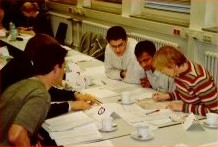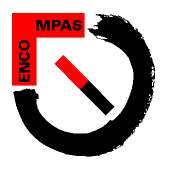Our conceptual approach
What distinguishes our seminars, courses and consulting activities? Why are
they so popular and successful? A long-term improvement of intercultural
communication skills requires many things. We have summarised the most
important aspects for you below. Intercultural Communication
-
 Our
approach to teaching background knowledge and skills in
intercultural communication
Our
approach to teaching background knowledge and skills in
intercultural communication
-
is
based on over 10 years of professional and personal experience
as an intercultural communication skills and language trainer, as
well as an engineer and manager
-
balances
cultural awareness with skills development and training,
which enables participants to cope with cross-cultural
communication conflicts independently and self-confidently in
the long run
-
puts
the role and potential of English language skills in
perspective as an indispensable intercultural communication tool
-
draws
on the main concepts researched in the body of international
literature on this subject area
-
is
uniquely characterised by our own multicultural backgrounds.
-
Our aim is to
-
provide
a knowledge base of intercultural communication issues and show
their impact on typical international business communication
behaviour (transparency)
-
guide
participants in transferring a conceptual understanding of cultural
differences into effective intercultural communication skills
(applications training)
-
provide
participants with functional tools in the long term for
identifying and solving cross-cultural communication problems
independent of trainers (workable solutions)
-
The
nature and importance of the relationship between language,
communication and culture is, unfortunately, too often
misunderstood or underestimated. All too often it is presumed that
simply speaking a foreign language well communicates a message
successfully across cultures. However, the
individual who is aware of how profoundly culture "colours"
not only how we say something, but more importantly what
we choose to say and not say, will
be the one who can successfully bridge cross-cultural communication
barriers.
-
Cross-cultural
dialogue is a two-step process. Just as we are normally
unaware of the grammatical rules of our native language, we are
equally incapable of explaining the logic behind our own
"cultural rules". Therefore, developing cross-cultural
communication awareness begins with first understanding the
assumptions and expectations embedded in our own culturally
conditioned communication behaviour.
This is the reference point for our experiences with other cultures, and this
approach invariably reveals to participants completely new and unexpected
perspectives. Only when we understand why we act or react the way we do, can
we then begin to understand how that may clash with other cultural behaviour.
-
 Our
introductory seminars do not first aim to be country-specific
(unless otherwise requested). A
much more accessible approach is to focus on a very few key
cultural concepts (e.g. the role of hierarchy, fact-based vs.
relationship-oriented interpersonal interaction, individual or group
orientation, to name a few), and how these in their various
constellations impact the communication behaviour of different
cultures.
Our
introductory seminars do not first aim to be country-specific
(unless otherwise requested). A
much more accessible approach is to focus on a very few key
cultural concepts (e.g. the role of hierarchy, fact-based vs.
relationship-oriented interpersonal interaction, individual or group
orientation, to name a few), and how these in their various
constellations impact the communication behaviour of different
cultures.
This impacts, for instance, every-day problem-solving, decision-making,
project-planning, workplace interaction, etc. This
basic framework uses global
scales to approximate where cultural "clusters" are
relative to each other in terms of these core values orientations.
For
participants of our seminars, this means not only a very
transparent and structured presentation of background knowledge and
skills, but also a substantially larger horizon without being
overwhelmed by too many details at once. A solid basis such as this
can then be extended with country-specific training modules.
-
Our
solutions have been developed over
more than a decade, uniquely combining experience and
insights in the fields of
intercultural communication and adult language education, with
the practical applications in
the work of an engineer and manager at an international level.
We integrate real-life case studies, practice-oriented activities
and exercises into a conceptual framework, providing workable
solutions to problems typically encountered in international
business situations.
These include
making first contact and relationship-building, meeting and
negotiating, decision-making, communicating about problems, giving
and receiving critical feedback, making and critiquing
presentations, project planning and implementation, etc. Effective
problem-solving skills in intercultural communication is just as
much about recognising which options would be viable solutions in
the other culture's eyes.
-
To
facilitate skills development, our seminars are designed to be very
interactive and practice-oriented, drawing too on the
experience of the participants themselves. Case studies and
examples provided by the trainer functioned as "springboards"
for group-specific applications and problem-solving. Even in the
shorter one-day format, the seminar is structured to progress
from guided discovery to independent analysis and problem-resolution
by the participants.
-
 While
seminar participants may find comfort in receiving many detailed
checklists and guidelines, the risk is that such simplified
checklists prescribe formulaic "solutions" to situations
where flexibility and judgement may be essential. We will
provide the participants with the skills and tools to create
their own checklists and guidelines in preparation for
your future cross-cultural encounters. A further
strength of this approach is that it aims at something far more
realistic than "the one correct" answer to
cross-cultural communication problems: it provides the tools to
make the most reasonably accurate assessment.
While
seminar participants may find comfort in receiving many detailed
checklists and guidelines, the risk is that such simplified
checklists prescribe formulaic "solutions" to situations
where flexibility and judgement may be essential. We will
provide the participants with the skills and tools to create
their own checklists and guidelines in preparation for
your future cross-cultural encounters. A further
strength of this approach is that it aims at something far more
realistic than "the one correct" answer to
cross-cultural communication problems: it provides the tools to
make the most reasonably accurate assessment.
-
If
our native cultural values colour the shape and form of our
language and communication style, then inevitably we transfer these
patterns to a foreign language, unless we learn to do otherwise.
Therefore, not only will "German-English" or
"Japanese-English" sound quite different from each
other, they'll sound different from native "English-English".
How we construct our arguments, organise persuasive messages, use
tone and word choice when communicating in tricky or critical
situations can be a source of considerable miscommunication despite
two people sharing a common language. One unique component of
our longer seminars guides
participants in identifying hidden problems in a
supposedly "neutral" English. We highlight the
distinct communication patterns behind the tone and texture of
"native" English
and reveal its true potential as the "perfect"
intermediary language. This is the key to
acquiring effective language skills in English for professional use.
Following
these principles, our seminars, workshops, and consulting work have
been consistently convincing and successful, as documented by the
excellent feedback we have received from seminar participants and
organisers, as well as from the clients of our consulting services.


 Our
approach to teaching background knowledge and skills in
intercultural communication
Our
approach to teaching background knowledge and skills in
intercultural communication
 Our
introductory seminars do not first aim to be country-specific
(unless otherwise requested). A
much more accessible approach is to focus on a very few key
cultural concepts (e.g. the role of hierarchy, fact-based vs.
relationship-oriented interpersonal interaction, individual or group
orientation, to name a few), and how these in their various
constellations impact the communication behaviour of different
cultures.
Our
introductory seminars do not first aim to be country-specific
(unless otherwise requested). A
much more accessible approach is to focus on a very few key
cultural concepts (e.g. the role of hierarchy, fact-based vs.
relationship-oriented interpersonal interaction, individual or group
orientation, to name a few), and how these in their various
constellations impact the communication behaviour of different
cultures.
 While
seminar participants may find comfort in receiving many detailed
checklists and guidelines, the risk is that such simplified
checklists prescribe formulaic "solutions" to situations
where flexibility and judgement may be essential. We will
provide the participants with the skills and tools to create
their own checklists and guidelines in preparation for
your future cross-cultural encounters. A further
strength of this approach is that it aims at something far more
realistic than "the one correct" answer to
cross-cultural communication problems: it provides the tools to
make the most reasonably accurate assessment.
While
seminar participants may find comfort in receiving many detailed
checklists and guidelines, the risk is that such simplified
checklists prescribe formulaic "solutions" to situations
where flexibility and judgement may be essential. We will
provide the participants with the skills and tools to create
their own checklists and guidelines in preparation for
your future cross-cultural encounters. A further
strength of this approach is that it aims at something far more
realistic than "the one correct" answer to
cross-cultural communication problems: it provides the tools to
make the most reasonably accurate assessment.